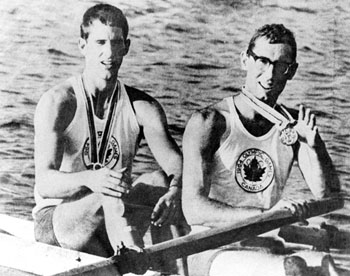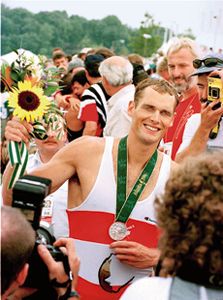Roger Charles Jackson, OC, AOE, rower, doctor, administrator (born 14 January 1942 in Toronto, ON). Roger Jackson and George Hungerford came out of nowhere to win the gold medal in the coxless pairs at the 1964 Olympic Summer Games in Tokyo. Having been cut from Canada’s rowing eights crew, they became known as the “Golden Rejects.” They were the only Canadian athletes to win gold in Tokyo that year. They received the 1964 Lou Marsh Trophy (now the Northern Star Award) as Canada’s athletes of the year. Jackson also competed in rowing at the 1968 and 1972 Olympic Summer Games before becoming an influential administrator. He was director of Sport Canada (1976–78), president of the Canadian Olympic Association (1982–90), CEO of Own the Podium (2005–10) and chair of the board of Canada’s Sports Hall of Fame (2010–12). He has been inducted into Canada’s Sports Hall of Fame both as an athlete and a builder and was made an Officer of the Order of Canada.

Childhood
Roger Jackson was born to Helen Marion and Harold Jackson. He has one brother, Robert, and two sisters, Martha and Kathryn. Jackson grew up in Toronto during the postwar era. At a time when it was uncommon for Toronto youth to participate in organized sports, Jackson played informal games in the park and playground.
Interest in Rowing
Roger Jackson began to compete in high-performance rowing while attending the University of Western Ontario in 1959. His interest in rowing was piqued when he saw a poster at the university that stated, “Rowing. Desire is the Only Prerequisite.” Jackson soon found out that he had the overall skill and endurance to be an elite and competitive rower.
In 1963, Jackson graduated with a Bachelor of Arts. He decided to attend the University of Toronto to pursue graduate studies. However, he had a strong desire to pursue rowing at the Olympic Summer Games and was aware of the success that the UBC rowing program enjoyed at the 1956 and 1960 Olympic Summer Games. He bought a one-way ticket to Vancouver and transferred to UBC, where he made the rowing team.
Qualifying for the 1964 Olympics
At first, Roger Jackson was hoping to make the Canadian Olympic rowing team in the men’s fours. However, during the 1964 Canadian Olympic Rowing Trials and National Championships in St. Catharines, one of Jackson’s teammates strained his back and the team struggled with a replacement rower. Jackson impressed the Canadian rowing coaching staff enough to be chosen as an alternate for the eights. He was also assigned to team up with Wayne Pretty of Winfield, BC, in the coxless pairs. However, Pretty was soon reassigned to the eights program when George Hungerford of Vancouver was diagnosed with mononucleosis. When Hungerford was healthy enough to return to rowing, he was told his only Olympic option was to join Jackson in the pairs.
The chemistry between Hungerford and Jackson took time to develop. Hungerford had never competed in the pairs before and initially struggled with the intensive training. It was common for him to sleep when not in the boat, since he was still suffering from the effects of mononucleosis. Jackson was not pleased with his situation and wondered if Hungerford was up for the challenge of not just contending for an Olympic medal but actually finishing the 2,000 m race.
1964 Tokyo Olympics
When Roger Jackson and George Hungerford arrived in Tokyo, they had a strong training regime and the fastest time in the heats. In the Olympic final, Jackson and Hungerford were well in control at the three-quarter mark of the race. At the time, they had a one-and-a-half length lead. Hungerford and Jackson’s winning time was 7:32.94, 0.46 seconds faster than the favoured Netherlands duo of Steven Blaisse and Ernst Veenemans.
The Canadian men’s eights, who did not have Hungerford or Jackson in their boat, finished a disappointing ninth place. Hungerford and Jackson’s gold medal victory was completely unexpected, earning them the nickname the “Golden Rejects.”
Later Athletic Career
Roger Jackson went on to compete at the 1968 Olympic Summer Games in Mexico City, where he was the flag-bearer for Canada in the opening ceremonies. He finished 11th in the single sculls. He then competed in the coxed fours at the 1972 Olympic Summer Games in Munich, where the crew finished 12th.
Education
Roger Jackson earned his master’s degree in physical education at UBC in 1967 and his doctorate in biodynamics at the University of Wisconsin in 1971. He completed a post-doctoral study at the University of Copenhagen.
Career as Administrator
After his rowing career, Roger Jackson played an instrumental role in Canadian sport as a builder. His positions included director of Sport Canada from 1976 to 1978, the dean of Physical Education at the University of Calgary from 1978 to 1988 and the president of the Canadian Olympic Association (now the Canadian Olympic Committee) from 1982 to 1990.
Jackson also chaired the advisory board for the 1988 Olympic Winter Games in Calgary and was the founding director and creator of the Sport Medicine Centre at the University of Calgary in 1988 (now called the Roger Jackson Centre for Health and Wellness). He was also president of the Canada West University Athletic Association in 1988, the chief executive officer of Own the Podium from 2005 to 2010, the chair of the board of Canada’s Sports Hall of Fame from 2010 to 2012 and the interim president of Alpine Canada in 2013.
Honours
Roger Jackson and George Hungerford received the Lou Marsh Trophy (now the Northern Star Award) as Canada’s athletes of the year in 1964. Jackson was later inducted into Canada’s Sports Hall of Fame both as an athlete (1964) and a builder (2010). He was made an Officer of the Order of Canada in 1984. He was also inducted into the UBC Sports Hall of Fame (2005), the University of Calgary Hall of Fame (2006) and the Alberta Sports Hall of Fame (2008). He received the Olympic Silver Order (1997), an honourary degree from the University of Calgary (2011), the Alberta Order of Excellence (2012) and an honourary degree from the University of Western Ontario (2015).
(See also Canadian Gold Medal Winners at Olympic Summer Games; Canadian Gold Medal Winners at Olympic Winter Games.)

 Share on Facebook
Share on Facebook Share on X
Share on X Share by Email
Share by Email Share on Google Classroom
Share on Google Classroom



